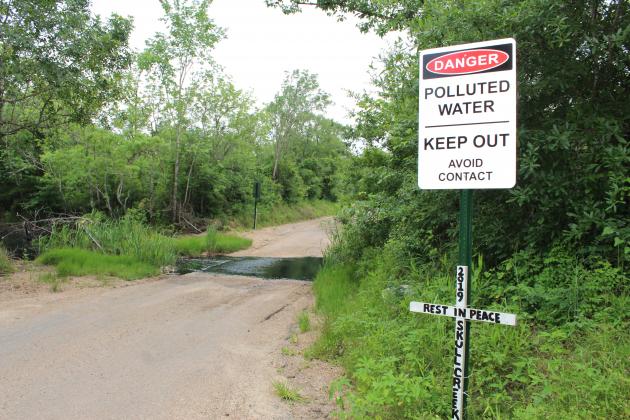SKULL CREEK: LCRA files to intervene in state’s lawsuit against Inland
Citizen | Vince Leibowitz
Skull Creek flows black with contamination at the low-water crossing of County Road 16 and the creek near Altair on Monday evening, April 29, 2019. The county erected the warning sign to the right of the creek after a lawsuit filed by the state against a local oil and gas waste recycling company alleged the water in the creek is so contaminated it has made the fish unfit for consumption, and presents a substantial danger to animal and human life. It is unknown who tied the white cross to the sign. Painted on the cross is the phrase, "RIP Skull Creek 2019."
AUSTIN—The Lower Colorado River Authority has filed a petition to intervene in the state’s lawsuit against Inland Environmental & Recycling alleging violations of the Texas Water Code in connection with conditions at its site and contamination in Skull Creek.
LCRA cites as grounds for intervening as a plaintiff its management of the water in the lower Colorado River.
The petition to intervene notes that LCRA issues water rights permits for water from the river, and is actively engaged in selling water from the river.
LCRA, established in 1934 by an act of the Texas Legislature, sells water from the river to cities in the region and other entities, and for agricultural and industrial use.
The agency notes in the litigation its jurisdiction includes the Colorado River within the county and Skull Creek.
The petition requests similar injunctive relief to a petition filed by the Texas Attorney General’s Office on behalf of the state and the Texas Commission on Environmental Quality last month, and a revised petition filed as part of the ongoing litigation Monday.
The petition also reveals new information about contaminants in Skull Creek and the Colorado River, allegedly coming from Inland.
It also sheds more light on the company’s alleged discharges into Skull Creek.
“The field and laboratory analytical results of … testing show that the water contained in Inland’s outfall pipe, which discharges from the Inland Facility directly into Skull Creek, greatly exceeds,” state permitted limits related to one of the company’s TCEQ permits for s variety of chemicals.
“Benzene, Total BTEX (benzene, toluene, ethylbenzene, and total xylenes), Polyaromatic Hydrocarbons (“PAHs”), and Total Petroleum Hydrocarbons (“TPH”),” are among the chemicals LCRA alleges were in the discharges that exceeded permitted limits, according to the petition.
The petition further alleges, “testing of the water in Skull Creek downstream of the outfall at US 71 also showed levels of Benzene, Total BTEX, and PAHs that exceeded Inland’s Permit limits.”
Six-hundred feet upstream from the outfall pipe, testing showed no such “exceedances,” the petition notes.
DISCHARGES
The Citizen first reported Wednesday that Inland’s owner, Davis Polston, allegedly told Railroad Commission officials he was discharging directly into the creek, but in compliance with TCEQ permits, days before the first incident of contamination in the creek was reported.
The Citizen was the first news outlet to reveal this information, gleaned from internal RRC communications obtained by the newspaper in response to a public information request filed with the agency pursuant to the provisions of the Texas Public Information Act, the state’s open records law.
COUNSEL
LCRA is represented by outside counsel in its efforts. Three attorneys from Bickerstaff Heath Delgado Acosta, LLP in Austin are listed as counsel of record on the petition.
BACKGROUND
On Feb 8, of this year, the first incident of contamination--odorus water as black as India ink and dead fish--was reported at the intersection of Texas Highway 71 Skull Creek near Altair in South Central Colorado County. Shortly thereafter, two additional incidents of similar contamination were reported within two months. This ultimately resulted in the creek perpetually flowing dark black, and emitting a pungent odor.
Between the report of the first incident on Feb. 8 and April 10, county officials sought answers from the Texas Commission on Environmental Quality, Texas Parks & Wildlife Department, and Texas Railroad Commission concerning exactly what chemicals were in the water and what action was being taken to stop the contamination, and receivd few.
In early April, Colorado County Judge Ty Prause, Colorado County District Attorney Jay Johannes, officials from the Colorado County Groundwater Conservation District, Lower Colorado River Authority, and the three agencies investigating the contamination met in the county courtroom of the Colorado County Courthouse in Columbus at the call of Chief W. Nim Kidd, the state's Chief of Emergency Management under the Governor's Office of Emergency Management. Prause requested Kidd call the meeting.
Prause characterized the meeting and the response of the involved agencies as, "beaurecratic chaos," and told The Citizen he received no answers on what was in the water, or if it was dangerous to humans, livestock, or wildlife.
On April 10, The Citizen revealed TCEQ, the state's environmental regulator, determined the water was a hazard to humans early as Feb. 12. The revelation was contained in a letter from the agency to Polston, ordering him to stop polluting and clean up his 300-acre site near Altair. A copy of the memo was obtained by The Citizen.
In its April 10 edition, with an A1 cover headlined, "Skull Creek: Two Months Later, STILL NO ANSWERS," the Citizen produced ten news stories and opinion content relating to the contamination at Skull Creek.
Later that week, the Texas Railroad Commission and Texas Commission and Texas Commission on Environmental Quality released copies of their earliest water testing results to Colorado County Judge Ty Prause and the newspaper.
On April 28, the Texas Attorney General's Office, on behalf of the state and TCEQ, filed a lawsuit in state district court in Travis County alleging inland had violated various provisions of the Texas Water Code, and seeking temporary and permanent injunctions against the company, requiring it to cease most of its operations, except operations permitted under two TCEQ permits. A judge granted the application for a TRO and set the case for a May 2 hearing to determine whether or not to grant a permanent injunction.
In the interim, for reasons still unclear, the case came up earlier in the week. Inland and Polston filed a motion for a continuance, which was opposed by the state.
In its filing opposing the continuance, the attorney general's office alleged conditions at Skull Creek and Inland had worsened, that the company was bulldozing gelatinous solid waste in to the ground, and that black substances were oozing out of the ground at the Inland site. The 300-acre Inland site includes about a mile of frontage along Skull Creek, according to a report from Terracon, a private company hired by the Texas Railroad Commission to remediate a portion of Inland's site surrounding an injection well the commission sealed for failure to report injection volumes in compliance with permit requirements in 2016.
Boundary Ventures, an Inland-affiliated company owned by Polston owned the injection well on the company's Altair site, later filed bankruptcy, and forfeited a $5.7 million performance bond and paid a $500,000 fine to the commission, according to information obtained from the commission's press office.
A continuance was ultimately denied, and and more restrictive temporary restraining order was issued by a judge. A hearing on a permanent injunction is set for May 13 in state district court in Austin.
Read all of the Citizen's Skull Creek coverage here.

